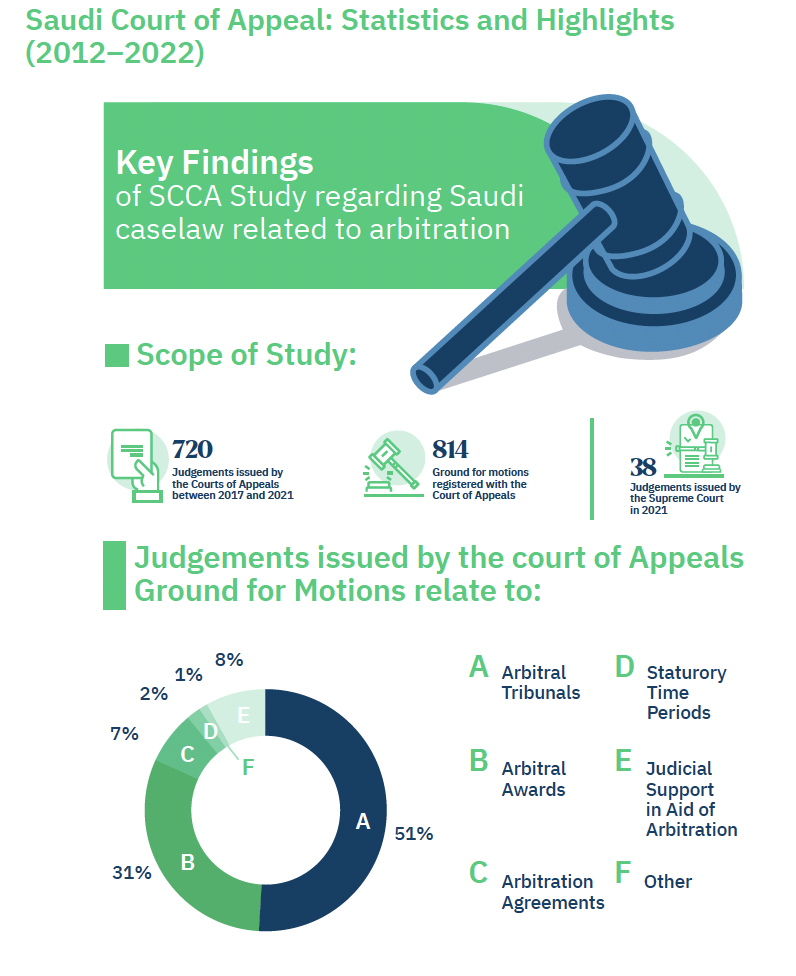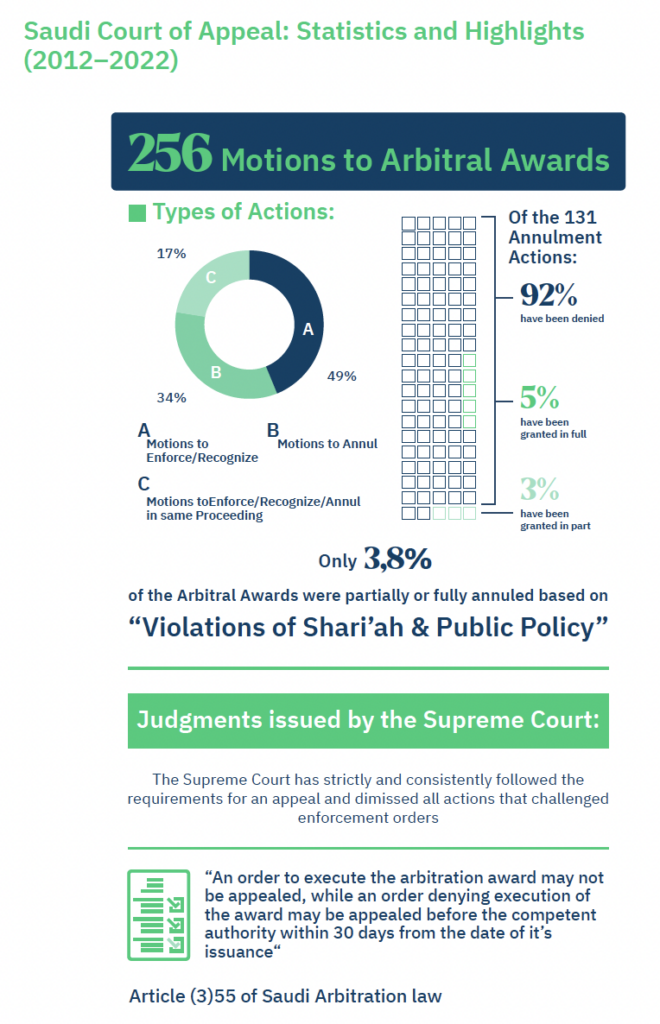This article was featured in our 2023 Construction Arbitration Report, which is part of a series of industry-focused arbitration reports edited by Jus Connect and Jus Mundi.
This issue explores the construction industry and presents a goldmine of information based on data available on Jus Mundi and Jus Connect as of May 2023. Discover updated insights into construction arbitration and exclusive statistics & rankings, as well as in-depth global and regional perspectives on construction projects, disputes, & arbitration from leading lawyers, arbitrators, experts, arbitral institutions, and in-house counsel.
THE AUTHOR:
James Macpherson, Special Counsel Saudi Center for Commercial Arbitration
Already exceeding a market value $120.4bn in 2021, the construction industry in Saudi Arabia is expected to continue to grow during 2023-2026 and beyond (See, Gulf Business, April 18, 2023, “An overview of the latest trends in the Saudi construction sector”).
Yet, as recently as 2017, a researcher concluded that, unlike in many other jurisdictions,“litigation is the method commonly used in the construction industry sector to solve disputes.”
In fact, at that time, it was suggested that ADR had been “rarely used because the public work contract prevents the use of methods other than litigation” (See, MATEC Web of Conferences, January 2017, “Dispute resolution methods in the construction industry sector in the Kingdom of Saudi Arabia”).
Today, Saudi Arabia’s dispute resolution landscape has been dramatically transformed into an arbitration-friendly jurisdiction.
Importantly, the Saudi government put in place legislation and regulations that encourage and facilitate the use of ADR in the Kingdom including making it possible for government contracts to have ADR clauses as part of a streamlined process to approve the use of arbitration.
Over the last 7 years, the track record of the Saudi Center for Commercial Arbitration (“SCCA”) has underscored its attractiveness and suitability to resolve commercial disputes between Saudi and international parties.
Taking into account the scale of local and foreign investment in the Kingdom, especially in major construction and infrastructure projects, many companies and governments are increasingly choosing to seat their arbitrations in the Kingdom and utilizing the SCCA as their arbitral institution. In fact, most international law firms operating in the region have predicted that the number of construction arbitrations seated in the Kingdom is likely to continue to grow.
Judiciary & the Courts
Parties always prefer a jurisdiction with a judiciary that is independent, competent and efficient, with expertise in international commercial arbitration and that is respectful of the parties’ choice of arbitration as their method for settlement of their disputes. According to the World Economic Forum’s Global Competitiveness Report (2019), Saudi Arabia achieved a global ranking of 16th in ‘judicial independence’, 17th in ‘efficiency of legal framework in settling disputes’ and 11th in ‘legal framework’s adaptability to digital business models’. Article 8 of the Saudi Arbitration Law and Article 2 of the accompanying Executive Regulations (22 May 2017) stipulate that the competent court for the purposes of arbitration is the Court of Appeal. Furthermore, article 17 of the Executive Regulations ensures that the Supreme Court hears appeals regarding the validity of arbitral awards.
Rights of Representation
The concept of party autonomy is paramount. Both the Saudi Arbitration Law and the institutional arbitration rules of the SCCA allow parties to be represented by any legal representative they wish, both local and foreign. Registration is not required. Further, and contrary to some misconceptions, under the Saudi Arbitration Law, parties can appoint any arbitrator, mediator, lawyer, expert or other representative regardless of gender, nationality or religion. Under article 14 of the Saudi Arbitration Law, however, sole arbitrators and panel chairs must hold a degree in law or Sharia.
Underscoring the Kingdom’s commitment to develop the legal profession and raise efficiency, Saudi Arabia has granted foreign licences to major international law firms. In March 2023, the first foreign law firms were granted licences to operate in the Kingdom. Clifford Chance, Herbert Smith Freehills and Latham & Watkins became the first three foreign law firms to be granted licences to practise law in Saudi Arabia since the Council of Ministers approved amendments to the Code of Law Practice on the subject. The ministry had previously approved implementing regu- lations for licensing foreign law firms. With the rule change, the Ministry of Justice aims to invigorate the legal profession, raise the efficiency of its practitioners and improve the business and investment environment in the Kingdom – including the ADR sector.
Enforcement
Arbitral awards are enforced in accordance with simple, prompt and effective procedures. Under the Enforcement Law, an arbitral award, to which an enforcement order is appended, is considered a writ of enforcement for which compulsory enforcement is permitted. In addition, Saudi Arabia is a signatory to the 1958 Convention on the Recognition and Enforcement of Foreign Arbitral Awards; Saudi courts are therefore required to give effect to private arbitration agreements and the recognition and enforcement of arbitral awards made in other contracting States.
“The growing track record of government and court support for arbitration in Saudi Arabia”, notes DLA Piper’s head of litigation and ADR, Henry Quinlan, “can only give international investors more confidence in bringing their business to the Kingdom”.
New SCCA Arbitration Rules 2023
After an extensive internal review and public consultation process in Saudi Arabia and abroad, SCCA published its revised Arbitration Rules on 1 May 2023. The new Rules apply to all arbitrations filed with the SCCA on or after that date.
SCCA’s new rules introduce some internationally benchmarked best practices. Most notably, the revised rules will have the advantage of not specifying a default seat of arbitration. This model could be ideal for many companies that operate in Saudi Arabia, the Gulf Region or have regional headquarters, and for international companies operating in the Middle East and beyond.
The new Arbitration Rules received widespread, favourable reviews across the local and international arbitration community, including in-depth reviews in well-known ADR industry publications and from over 20 international law firms’ arbitration practice groups.
Independent commentators have remarked that “by enhancing the quality and efficiency of the arbitration process, the SCCA is playing an important role (…) helping to position Saudi Arabia as a key player in the global arbitration market”.
SCCA’s 2023 Rules “also clearly signal an intention by the SCCA to continue reviewing and updating the rules to address practical and commercial concerns identified by arbitration users and practitioners at a pace that few, if any, other arbitral institutions have matched in recent years. In doing so, the SCCA is positioning itself as a forward-thinking, innovative and modern institution” (See, Dentons, May 4, 2023, “Another small step for the SCCA, another leap forward for international arbitration in the Middle East”).
“Most importantly,” adds another law firm, “the changes introduced under the New Rules will bring SSCA arbitrations in line with international best practice and will further enhance the Kingdom’s growing reputation as an arbitration friendly jurisdiction” (See, Clyde & Co, May 8, 2023, “SCCA announces new Arbitration rules: another step forward for arbitration in the Kingdom of Saudi Arabia”).
The trend among clients was such that one law firm noted that: “Our experience is that parties active in the Kingdom take an acute interest in dispute resolution clauses that include reference to SCCA arbitration”.
Early Disposal of Claims and Defences
SCCA has introduced new procedures for what is effectively the summary disposal of claims in the context of commercial arbitration. This approach “should also ensure that claims can be disposed of efficiently” (See, Herbert Smith Freehills, by Stuart Paterson, Nick Oury and Sean Whitham, May 31, 2023, “New SCCA Rules: strengthening the case for arbitration in the KSA” | Middle East Bulletins).
Outlined in Article 26, the new procedures: “allow the Tribunal to dispose of jurisdiction, admissibility or legal merit issues raised in a claim or defence without needing to follow every step that would otherwise need to be taken in the arbitration. This essentially amounts to a form of summary judgment and allows the Tribunal to deal with issues such as claims that lack merit, or those where no award could be issued under the applicable law, to be dealt with in a timely manner” (See, Herbert Smith Freehills: here).
Consolidation and Multi-contract Arbitration
“The Rules now include consolidation and multi-contract provisions, which are particularly useful for disputes relating to large construction and infrastructure projects that typically involve a number of related contracts on the same project.
In particular, Article 11 allows for claims arising out of or in connection with more than one contract or arbitration agreement to be referred to a single arbitration. Article 13 contains provisions in relation to the consolidation of two or more arbitrations commenced under the same arbitration agreement, where the disputes arise from the same legal relationship, or the parties agree to consolidation” (See, Herbert Smith Freehills: here).
Parties and their counsels are generally keen to see that institutional rules both enshrine principles of party autonomy and choice, while also empowering tribunals to curb party procedural abuses. As UK-based practitioner-arbitrator Michael Patchett-Joyce noted recently: a careful balance has been struck whereby, for example, the SCCA Arbitration rules “now expressly recognise that parties may be represented by foreign counsel and empower tribunals to supervise and control changes in party representation as a procedural safeguard” (See, Michael Patchett-Joyce, May 8, 2023, “The New Saudi Rules Reviewed”).
Recent Appointments of International Experts
Since 2021, SCCA has added high-profile ADR experts to its board of directors and rules advisory committee as part of its objective to provide first-class rules and services that are responsive to industry needs while being transparent and consistent, and that adhere to international best practices.
A Royal Decree was issued on March 23, 2021, appointing the third independent board of directors of SCCA, chaired by Walid Abanumay with Toby Landau appointed as Vice-Chair. The diverse board includes eminent international arbitration experts from Saudi Arabia, Egypt, France, the United Kingdom and the United States, with experts in law and Sharia as well as business sector leaders.
Half of the incoming board members are leading international arbitration experts, and all are leaders from the business, legal, finance and banking sectors. The new board now reflects more diversity in terms of specialisations, gender and nationalities – with foreign experts comprising 40 per cent of the board, and a foreign Vice-Chair. This diversity enhances and promotes international best practices of SCCA while also reinforcing SCCA neutrality and independence from the public sector.
This decree further implements the SCCA’s Statute stipulating that SCCA must have an independent board of directors serving for a term of three years, and that is renewable once.
To ensure the independence of the SCCA committees, world-renowned new members with long-standing experience in institutional arbitration and who are not Saudi nationals joined the SCCA rules advisory committee, which now has 16 members and is chaired by international Arbitration expert Richard Naimark.
In November 2022, SCCA announced the creation of an independent ‘SCCA Court’ to determine technical and administrative matters related to its caseload, featuring leading international figures including Jan Paulsson as the first President, and two Vice Presidents: Ziad Bin Abdulrahman Al-Sudairy, an arbitrator and principal of the Ziad A Al-Sudairy Law Office in Riyadh and James Hosking, founding Partner of Chaffetz Lindsay in New York. The 15-person court will enhance the consistency of its approach and ensure it is in line with international best practices. It will also improve its operations generally and safeguard quality services into the future.
With arbitration experts from 13 different countries, the SCCA Court is comprised of highly qualified and eminent international arbitrators, former leaders of arbitral institutions, retired appellate judges, partners of international law firms and law professors from renowned universities.
Caseload and Judicial Enforcement
In 2021, courts in Saudi Arabia enforced 204 domestic and foreign awards, representing an aggregate value of US$2.1 billion, with enforcement proceedings being resolved on average within two weeks. Since the Saudi Arbitration Act in 2012, there have been approximately 35,000 applications for enforcement with an aggregate value of enforced arbitral awards coming in at just over US$6.16 billion. In 2019, more applications for enforcement were filed than had been filed between 2013 and 2018.
The latest SCCA study of Saudi case law, related to arbitration published between 2017 and 2022, indicated that of 720 judgments examined there were 814 grounds why a party approached the courts. Of those 814 grounds, 256 (or 31 per cent) related to motions regarding awards (both to enforce and annul). Of the 256 grounds, 131 were related to motions to annul. Of those 131, 120 (or 92 per cent) were denied, leaving an 8 per cent success rate (or 11 motions). Of these 11 motions, seven were granted in full and four only in part. Of the 24 sharia grounds identified, only five were successful (or 21 per cent).
These findings have not only been generally well received by the parties involved in each case, they have also proven compelling and reassuring for local and foreign parties and their counsel assessing Saudi Arabia as a place to do business – and, if needed, enforce arbitral awards.


Since its launch in October 2016, SCCA has registered almost 300 filings valued at US$1.4 billion, involving domestic and international parties from sectors including banking and finance, capital markets and investment, construction and engineering, and arts and entertainment – and involving over 20 nationalities.
Conclusion
SCCA, launched in late 2016, has established itself as a major player in commercial dispute resolution in the Kingdom and internationally.
Having registered some 300 filings with parties from over 20 different countries since its launch, it has become a well-regarded and trusted arbitral institution. With a solid track record of administering disputes in both the private and public sectors involving 21 different industry sectors, those engaged in the construction and infrastructure disputes can name the SCCA as the institutional provider for arbitration to be administered under its rules with a high degree of confidence.
The decade-long transformation of all aspects of the Saudi ADR practice, profession and industry outlined in this article has been profound, comprehensive and likely to endure. Importantly, the Saudi judiciary has a solid record of skilfully and consistently adjudicating matters related to arbitration, and providing the judicial support required for a consistent record of successful enforcement of local and foreign arbitral awards.
With its now well-established local, regional and international reputation as a first-rate ADR institution, SCCA benefits from operating in an arbitration-friendly jurisdiction – reflected in its rapidly increasing caseloads.
ABOUT THE AUTHOR
James MacPherson is Special Counsel, SCCA, and a leading International Dispute Resolution Specialist with over twentyfive years’ experience within public & private sectors as a Neutral (arbitrator, mediator & facilitator), ADR Trainer, Advisor and Systems Designer – including creating three world-class international ADR Centres in the GCC.
Find more data-backed insights in our 2023 Construction Arbitration Report





